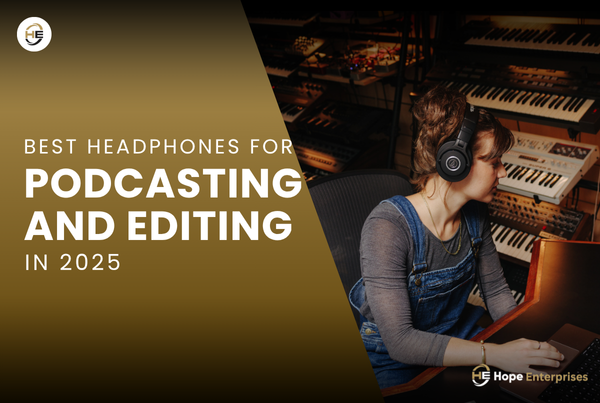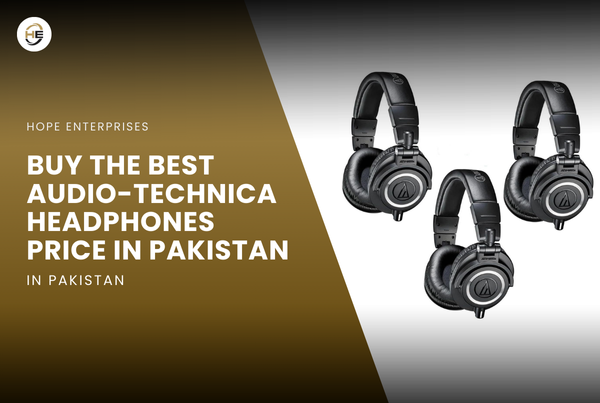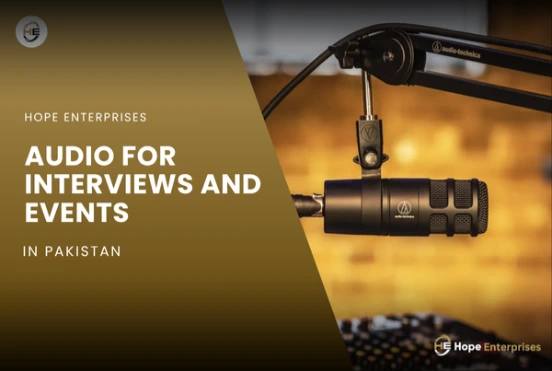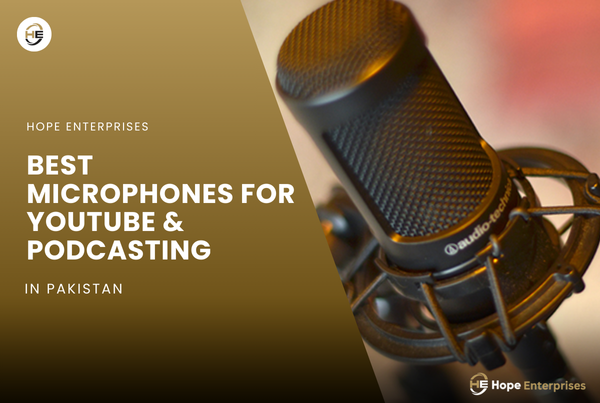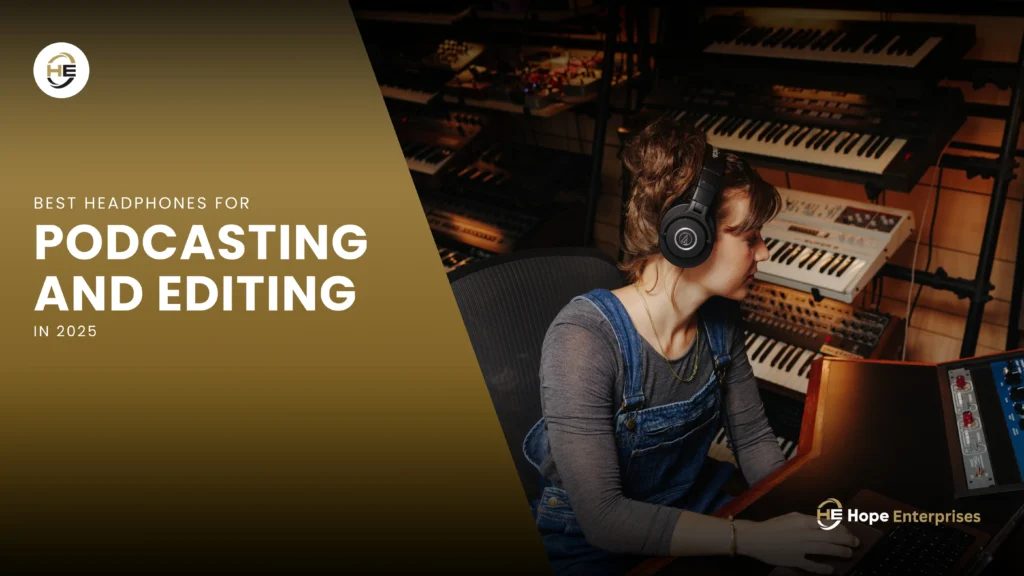
The ability to produce a podcast that sounds professional and clear relies on numerous things. A good pair of headphones for podcasting is one of the most significant equipment in your system. Good headphones can assist you in hearing every detail of your audio, whether you are a beginner, a professional podcaster, or an editor. The space of podcasting has expanded at an unprecedented rate in 2025, and the demand for high-quality audio devices is also increasing. There are too many options out there, and sometimes it can be confusing to choose the right pair.
This guide will assist you in the process of finding the ideal solution by dividing the key features and providing the best suggestions. We will discuss the ideal headphones to use in podcasting and editing, depending on their features and potential benefits to the buyer. It is time to jump into the depths of the reasons why headphones are important and how they can fit your production quality.
Why Headphones Matter for Podcasting and Editing
Every sound is important when you record a podcast: the sound of your voice, the noise in the background, or a minor audio glitch. Using headphones for podcasting will make you hear what you are recording just the way your audience will. When you have good headphones, you are in a position to listen to yourself as you speak, which means you can control the tone, volume, and rate of your speech. To the editors, proper sound monitoring will enable them to correct errors such as plosive, echo, or undesired background sound.
Without quality headphones, you risk publishing episodes with unbalanced audio, which can hurt your podcast’s credibility. In simple words, good headphones are not merely an accessory but a necessity for the creation of professional and engaging content.
Features to Look for in the Best Podcasting Headphones
To purchase the most appropriate headphones for podcasting, you should pay attention to the factors that enhance the sound quality, comfort, and usability. These are the key features that you should consider.
Sound Accuracy and Flat Frequency Response
Podcasting and editing require sound accuracy. Choose headphones with flat frequency responses. This is because the headphones do not amplify or reduce specific frequencies to provide you with an accurate image of your recordings. This is particularly useful when editing it, as you can make fine changes without guessing how the audio will sound to your audience.
Closed-Back vs. Open-Back Headphones
Closed-back headphones are excellent for recording due to their ability to block external noise and avoid sound leakage. They enable you to be fully engaged in the voice without the distractions. On the contrary, open-back headphones are more suited to editing. They produce a natural, airy sound that is ideal for detailed listening. If you can, get both of them: closed-back to record and open-back for post-production.
Comfort and Build Quality
Listening to podcasts and editing marathons may take hours. Find light headphones that have soft ear pads and headbands that can be adjusted. It is also important to have durable materials that will extend the life of your investment. A comfortable pair of headphones will help you avoid feeling tired, and you can remain productive.
Wired vs. Wireless for Podcasting
Wireless headphones are commonly used daily; however, wired headphones are superior when it comes to podcasting. They offer stable connections with no or minimal latency, which is very important when viewing live recordings. However, the current wireless technology is much better. If mobility is important for you, some wireless options now offer near-zero lag and studio-quality audio.
Best Headphones for Podcasting and Editing in 2025
The recommendations below outline the best headphones for podcasting and editing in 2025, depending on the budget and use cases. All these options guarantee outstanding sound quality, comfort, and reliability to both beginners and professional podcasters.
Audio-Technica ATH-M50x – Reliable Classic for Podcasters
In 2025, the ATH-M50x will remain one of the preferred models by podcasters and audio professionals. This closed-back model has a great level of sound clarity and will provide accurate monitoring and minimal levels of sound leakage, which is suitable in recording sessions. The cushion ear pads give it a comfortable feeling during the long hours, plus the foldable design makes it portable and a travel-friendly gear. It is appropriate for both those who are just starting and those who are experts. This professional monitor headphone for podcasting is durable, performs reliably, and provides a stable audio quality to produce podcasts and edit work.
Audio-Technica ATH-M20x & M40x – Budget-Friendly Options
The ATH-M20x and M40x are good entry-level models with great performance at a relatively low cost. M20x is ideal when one wants reliable monitoring of solo recording. M40x offers more balanced sound, which makes it versatile for people who need to work on recording and light editing. The two models are lightweight and durable, and easy to carry, making them ideal for on-the-go creators. They provide high-quality audio on a professional level, which allows aspiring podcasters to get quality and good recordings without pushing their budget to the limit.
Audio-Technica ATH-R70x – Premium Open-Back for Editing
The ATH-R70x is designed for serious editors who require precision and natural sound. It has an open-back style that offers an expansive, realistic auditory experience, which is ideal in the fine-tuning of audio in post-production. Although it is not the ideal option when it comes to recording due to sound leakage, it is an excellent device when it comes to identifying minute details in your tracks. It can fit long editing sessions because of its ultra-lightweight construction and comfortable ear pads. To achieve professional results in podcast editing, the ATH-R70x is very clear and very accurate, which ensures smooth and well-balanced final audio output.
Wired vs Wireless Headphones – What Works Best for Podcasting in 2025?
Choosing between wired and wireless headphones depends on your workflow. In 2025, wireless technology has advanced, although wired headphones are still the best when it comes to real-time monitoring.
| Feature | Wired Headphones – Best for Podcasting | Wireless Headphones |
| Latency | Zero latency – perfect for live recording and monitoring | Minimal latency with advanced models |
| Sound Quality | Consistent and stable for accurate sound editing | High-quality but depends on Bluetooth version |
| Mobility | Limited movement while connected to devices | Full freedom to move around |
| Reliability | Always reliable, no battery needed | Needs regular charging |
| Best Use Case | Recording sessions and precise editing – ideal for podcasting | Casual editing and on-the-go listening |
Why Wired Headphones Are Best for Podcasting
Wired headphones are the best that podcasters can use as they have zero latency, consistent sound quality, and reliability in live recording. Wireless headphones are more convenient when you need to move or listen to a podcast casually, but they are not as reliable for producing professional podcasts.
Recommended Headphones for Different Needs
All the podcasters have different needs. The following is a guide to selecting the right headphones for podcasting depending on your objectives:
- For Beginners: Beginners require affordable but good-quality headphones. Audio-Technica ATH-M20x is ideal for a small setup of a solo podcaster. It is simple to use and provides good sound without adding unnecessary features. These headsets allow new creators to concentrate on perfecting their recording abilities without spending a lot of money on them.
- For Professional Podcasters: Experts demand the highest quality of sound and longevity. The most popular one is the Audio-Technica ATH-M50x. It guarantees the crystal-clear sound required in high-quality production works and live records. When you travel a lot or work in a team, it is worth adding the M40x to get a backup so that you maintain flexibility.
- For Editors: The editors take hours to refine every episode. The ATH-R70x is recommended because of its design, which is an open back and accurate reproduction of sound. It enables the editors to listen to every little detail, and the post-production is smoother and more precise.
- For On-the-Go Creators: Mobile podcasters need lightweight and portable options. The M20x offers excellent performance while being easy to carry.
If wireless freedom is important, consider a high-quality Bluetooth model with low latency. Just make sure it supports wired mode for critical recording sessions.
Final Thoughts
Identifying the most suitable headphones for podcasting in the year 2025 does not necessarily have to be complex. Pay attention to such aspects as the accuracy of sound, the comfort, and the quality of the building. Closed-back wired headphones are the best when it comes to recording. Open-back models are the finest in detail and accuracy when it comes to editing. No matter what your level of expertise and experience is in the field of podcasting, whether you are a newcomer or an experienced podcaster, an editor, or an on-the-go creator, the appropriate headphones will make your podcast sound professional and captivating. So, you should invest in quality, and your audience will notice the difference.
FAQS
Wireless headphones are usable in podcast editing, though wired headphones are more dependable. The wired models have zero latency and stable sound quality, which is mandatory for the correct editing and capturing audio during the post-production stage
Closed-back headphones isolate external noise and prevent leakage of sound, which makes them the best for recording. The open-back headphones are very natural and spacious-sounding, ideal for detailed editing; however, they cannot be used in recording because of the sound bleed.
The Audio-Technica ATH-M20x is a great option for beginners. It is affordable, lightweight, portable, and provides the ability to record and monitor, which is why it suits individuals who are new to podcasting in Pakistan.

